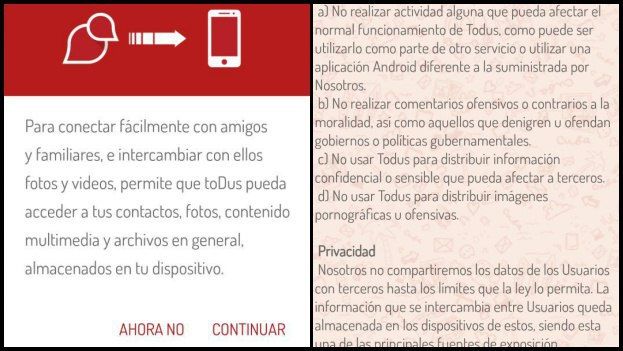
![]() 14ymedio, Yoani Sanchez, Havana, 2 July 2018 — While Cubans are counting the days until internet service is available for mobile phones, the saga of offline tools is writing a new chapter. The latest app developed on the island has been baptized ‘toDus’ and is presented as a Cuban WhatsApp.
14ymedio, Yoani Sanchez, Havana, 2 July 2018 — While Cubans are counting the days until internet service is available for mobile phones, the saga of offline tools is writing a new chapter. The latest app developed on the island has been baptized ‘toDus’ and is presented as a Cuban WhatsApp.
The free messaging application, available in a version for Android, can be downloaded from the first made-in-Cuba apps store Apklis, where it shares space with tools designed, for example, to find products in the shortage-plagued markets of the island, or a video biography of Ernesto Guevara, among others.
ToDus, created by the University of Computer Science (UCI) in collaboration with the state telecommunications monopoly Etecsa, is one example of a trend that official entities have promoted with little success among the users of the Island: the creation of rivals as substitutes for apps from popular American companies that have spread around the world such as Facebook, Twitter, WordPress and Wikipedia.
Despite the high prices to browse the web and the small number of households with connections, Internet users on the island seem to prefer universal tools and have become accustomed to the same social networks that can be used by someone in Berlin, Montevideo or New York, so for many the choice to use a national impersonation is not convincing.
In a country with a high level of emigration, interaction in chats, forums and social networks on internationally available apps is vital for everything from getting a visa to receiving remittances. In the five-year period between 2012 and 2017, Facebook accounted for 87.17% of web traffic from Cuba on social networks, followed by Twitter with 8% and Pinterest with 3%, according to data from the measurement and analysis tool StatCounter Global Stats.
In this context, the greatest and almost unique attractions of a national chat variant lies in its free nature and its offline operation. The first will be a factor in its lifespan, given the precarious wages earned by Cubans, but the second could be about to change if Etecsa sells data packages that allow the use of WhatsApp or Telegram.
The most significant reason for choosing foreign variants is the security and privacy of conversations. Although UCI’s director of networks, Tadier Perdomo, said that all messages “travel encrypted and are not stored on the servers,” but only on the devices of the sender and receiver, users don’t know what “other eyes” are observing the content.

The “Terms and conditions of use” specify that the user should not “make comments that are offensive or contrary to morality, as well as those that denigrate or offend the government or government policies.” The warning refers directly to political issues frequently blocked by Etecsa, which filters even text-only messages (SMS) with the words “dictatorship” or “democracy.”
In order to use all the features of toDus, the customer must accept that the tool has access to the photos, videos, multimedia content and general files on their device. However, when that premise is accepted, it is clear that the official program, created and promoted by the Government, has access to everything on the phone.
Just as the great giants of technology, such as Facebook or Google, have been questioned about the use they make of their clients’ personal data, toDus is vulnerable to the same problems. In the Cuban case, the information would go to the authorities instead of to companies who intend to use it to generate financial returns.
So far it is unknown if a message sent through toDus can be used as evidence in court or shown in the national media, as has often been the case with the private correspondence of activists and opponents. The consequences to a user who openly criticizes the president of the country or an institution through the service are also unknown.
Clarifying these questions and defining the limits of the privacy of this new tool would go a long way towards allaying the fears and mistrust it is already generating. In some Havana neighborhoods, with a heavy does of irony, the application has already been baptized “the ‘cederista’ chat,” a reference to the national Committee for the Defense of the Revolution (CDR) blockwatch committees that maintain files on and inform on all citizens with a focus on “counterrevolutionary activity.”
Despite the suspicions surrounding toDus, the tool has been downloaded almost 200,000 times since it was announced on June 20. A fact that is less surprising given that the students and workers of the University of Computer Science and the state-managed Young Computer Club have been given “the task” of swelling the numbers of customers, as 14ymedio was able to confirm.
Beyond the headlines in the international press, which reports that the “Cuban WhatsApp” is causing a furor on the island, toDus faces the test of time.
In its beta version, there is still much about the app that needs to be improved, including the delay, often excessive, the SMS registration, unforeseen crashes that end with the tool closing, messages that are sent but never reach their recipients, and the fact that it is still not possible to make voice or video calls. All issues that technically undermine the app’s performance.
However, the hardest battle to fight against is the preferences of Cubans themselves. These tend to point the internauts’ compasses towards services accessible world-wide, which make them feel part of the great global village and a little bit safe from the strict eyes of State Security.
_______________________________
The 14ymedio team is committed to serious journalism that reflects the reality of deep Cuba. Thank you for joining us on this long road. We invite you to continue supporting us, but this time by becoming a member of 14ymedio. Together we can continue to transform journalism in Cuba.
